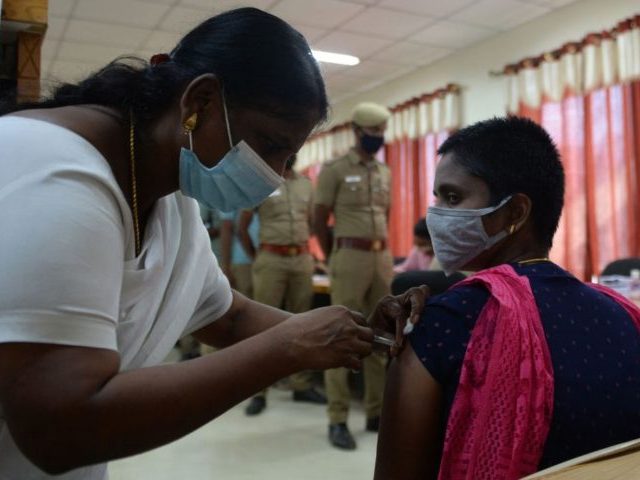States across India re-imposed lockdowns Monday to contain a surge in new Chinese coronavirus cases nationwide.
“The national weekly positivity rate [for the Chinese coronavirus] has increased from 3 percent to 13.5 percent in the last one month,” the Times of India reported April 19. In New Delhi, the Indian national capital, “the daily positivity rate in the last 12 days doubled from 8 percent to 16.7 percent. A consistent rise was seen since April 12 even as tests increased only marginally.”
Delhi’s government imposed a six-day lockdown on its residents starting April 19 in an effort to curb transmission of the Chinese coronavirus. Delhi is both a city and an Indian federal territory. Officially known as the National Capital Territory, Delhi contains the city of New Delhi.
“Delhi’s health system is now unable to take in more patients. It is now necessary to impose a lockdown in Delhi from 10:00 pm today (April 19) to 5:00 am on Monday (April 26). Essential services will remain open, food and medicine shops will be allowed to operate, weddings will be limited to 50 guests,” Delhi Chief Minister Arvind Kejriwal said Monday.
Delhi has ordered all government and private business offices, except for those facilitating essential services, to shut down for the next week. Essential workers, medical patients, and top government employees are among the limited number of people allowed to travel into and out of Delhi during the lockdown.
“Central government and judicial officials, diplomats, journalists, and doctors will be allowed to travel during the lockdown on production of a valid identity card,” the Hindustan Times reported on April 19. “People coming from or going to airports, railway stations, or interstate bus terminals will be allowed on production of a valid ticket.”
“But all other workers – grocery shop staff, internet workers, bank staff, delivery personnel, petrol pump workers, private security staff, among others – and the staff operating religious places in the city will need to show a valid curfew pass to be allowed to travel,” according to the newspaper.
India’s eastern Bihar state and southern Tamil Nadu state have also ordered their residents to observe a lockdown over the next several days to contain soaring coronavirus caseloads.
“All malls, parks, cinema halls across the state have been closed and restaurants have been kept open only for takeaways. Educational institutions and religious establishments will be closed till May 15,” Bihar Chief Minister Nitish Kumar announced on April 18.
Tamil Nadu’s government has ordered the state’s residents to observe a night curfew from 10:00 p.m. to 4:00 a.m. starting April 20. “The new restrictions are in place until further orders,” the state’s government announced Sunday.
Bihar recorded 8,690 new cases of the Chinese coronavirus from April 18-19, along with 27 deaths from the disease. Tamil Nadu recorded an “all-time high” in daily coronavirus infections during the same 24-hour period, “with 10,723 fresh cases and 42 deaths,” according to the Hindustan Times.
India’s surging coronavirus caseload seems to indicate that its coronavirus vaccine campaign, touted by New Delhi as the “largest in the world” when it launched in January, has failed to protect much of the country’s population of nearly 1.4 billion against the Chinese coronavirus. New Delhi launched the first phase of its coronavirus vaccine drive on January 16 with the goal of inoculating 300 million people against the virus. The Indian government approved two domestically produced Chinese coronavirus vaccine candidates for use as part of the campaign on January 4.
One of the vaccine candidates is called “Covishield” in the country and was developed jointly by Oxford University and the U.K.-based drug-maker AstraZeneca. The Serum Institute of India is currently manufacturing the shot. Another Indian-made vaccine candidate, “Covaxin,” was produced by the Indian company Bharat Biotech and approved for emergency use before it had completed Phase III clinical trials. Bharat Biotech released final stage clinical data on Covaxin’s efficacy rate and safety on March 3, demonstrating the vaccine to be 81 percent effective against the Chinese coronavirus.
The Times of India reported last week that India was suffering from coronavirus vaccine shortages. Some state-run health clinics in the northern Indian state of Assam were recently forced to turn away patients seeking a second dose of coronavirus vaccines due to a lack of supply.

COMMENTS
Please let us know if you're having issues with commenting.